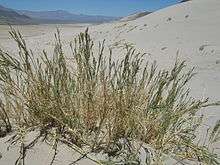Swallenia
Swallenia is a rare genus of plants in the grass family, found only in Death Valley National Park, California.[2][3]
| Swallenia | |
|---|---|
 | |
| Scientific classification | |
| Kingdom: | Plantae |
| Clade: | Tracheophytes |
| Clade: | Angiosperms |
| Clade: | Monocots |
| Clade: | Commelinids |
| Order: | Poales |
| Family: | Poaceae |
| Subfamily: | Chloridoideae |
| Tribe: | Cynodonteae |
| Subtribe: | Scleropogoninae |
| Genus: | Swallenia Soderstr. & H.F.Decker |
| Species: | S. alexandrae |
| Binomial name | |
| Swallenia alexandrae (Swallen) Söderstr. & Decker | |
| Synonyms | |
| |
The only known species is Swallenia alexandrae, known by the common names Eureka dunegrass[4] and Eureka Valley dune grass. This genus was named for American botanist Jason Richard Swallen (1903-1991).
Description
This is a rare plant endemic to Inyo County, California, where it is found on a single isolated dune system, the Eureka Valley Sand Dunes in the Eureka Valley of the Mojave Desert, within Death Valley National Park.[5][6]
Description
Swallenia alexandrae is a coarse, tufted perennial grass which grows in sand from thick rhizomes. Its stiffly erect clums, sharp-leafed grass, and erect pale-colored panicle inflorescences are diagnostic.[7]
Endangered status
This is a federally listed threatened species of the United States.[8] The main threat to the species survival has been off-roading, which is no longer permitted in its habitat. Trespassing off-roaders and campers are still a threat to the five remaining occurrences.[1]
References
- The Nature Conservancy
- Soderstrom, Thomas Robert & Decker, Henry Fleming. 1963. Madroño 17(3): 88
- Swallen, Jason Richard. 1950. Journal of the Washington Academy of Sciences 40(1): 19-21 descriptions in parallel English + Latin, discussion in English, photo of herbarium specimen
- "Swallenia alexandrae". Natural Resources Conservation Service PLANTS Database. USDA. Retrieved 4 December 2015.
- Biota of North America Program 2013 county distribution map
- University of British Columbia Botanical Garden and Centre for Plant Research, Botany Photo of the Day, Swallenia alexandrae, By Daniel Mosquin on December 7, 2007
- Jepson Manual Treatment
- Plant Conservation Report
External links
- Calflora Database: Swallenia alexandrae (Eureka Valley dune grass, Eureka dunegrass)
- Jepson Manual treatment for Swallenia alexandrae
- Grass Manual Profile
- Swallenia alexandrae — UC Photos gallery
